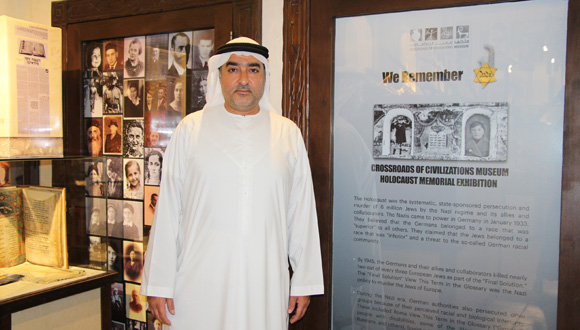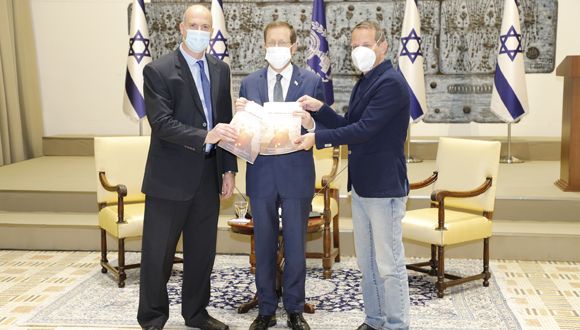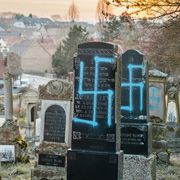Shining A Light in the Darkness
Amid growing concerns from global Jewish communities, TAU releases a report on positive trends in the war on antisemitism
TAU’s Center for the Study of Contemporary European Jewry published a report highlighting positive trends in the global war against antisemitism, thus creating new paradigms for global dialogue and positive change. TAU Prof. Uriya Shavit, head of the Center, presented the report to Israel’s President Isaac Herzog on International Holocaust Remembrance Day (January 27) at his official residence in Jerusalem.
Entitled “For a Righteous Cause - Positive Trends in Fighting Antisemitism and Radicalization”, the report showcases the year’s most important developments in the fight against antisemitism and offers policy recommendations for enhancing their impact.
"As antisemitism rises across the world, the international fight against it is also intensifying. We are witnessing many global initiatives for combating antisemitism, and we must encourage and foster these positive trends,” said President Herzog, a TAU alumnus. “Strengthening the light is just as important as fighting the darkness. I thank the Center for its dedicated research and faithful work in monitoring antisemitism worldwide."
Shifting the Discourse
For over a decade, the Center team at TAU has published a well-known annual report on alarming antisemitic incidents in the world. This is the first year the Center has published a report on positive trends.
"Discourse on antisemitism and radicalization usually focuses on troubling trends. We decided that a positive report, describing encouraging developments and activities, should also be published,” said Prof. Shavit of The Lester and Sally Entin Faculty of Humanities.
Shavit underlined three main reasons for the publication: expressing appreciation for those leading the trends; impelling more governments and organizations worldwide to follow suit; and promoting dialogue about improving existing programs.
Models for Change
The Report presents several surprising and promising shifts in paradigms around the world and across public discourse arenas. It highlights overtures in Eastern Europe and the Arab World along with legal and civic measures taken by elite sports teams, governments, NGOs and the public sphere.
In Eastern Europe, specifically in Poland, Ukraine and Slovakia, a growing number of non-Jewish grassroots initiatives, such as Rohatyn Jewish Heritage, are restoring Jewish cemeteries and preserving the memory of the multiethnic society that existed in the region before the Second World War.
In the Arab world, the UAE and Bahrain are leading the way in making Jewish life, culture and history more visible in society. The first Holocaust exhibit in the region opened recently at the Crossroads of Civilizations Museum in Dubai, while synagogues and Jewish cultural centers are being restored and opened to the public.

Ahmed Obeid Al Mansoori, Founder of Crossroads of Civilizations Museum (Photo: Crossroads of Civilizations Museum)
In major sports organizations, popular international teams have stepped forward to combat antisemitism that has long been rampant among fans and players alike. Encouraging actions are being conducted at all levels—from the EU and national associations through the teams, all the way to the fans themselves. European soccer teams made a particularly strong effort, with top-league British, Austrian, German and Dutch clubs launching educational initiatives for their players and fans and raising the banner of zero-tolerance for antisemitic slurs.
Several national courts in Europe and North America set a series of encouraging precedents in fighting antisemitism in 2021, restraining the so-far almost unrestricted dissemination of propaganda. One important example was the ruling of the European Court of Human Rights against a Bulgarian member of parliament who had continuously used antisemitic rhetoric in his books.
Governments and NGOs in many countries also launched action plans to combat antisemitism, such as allocating funds for protecting Jewish communities and relevant training programs; appointing special envoys for fighting antisemitism; advancing legislation against manifestations of antisemitism’ organizing international conferences; issuing public declarations; and adopting the International Holocaust Remembrance Alliance, IHRA’s Working Definition of Antisemtism.
The full Report by the Center can be read on its website.






